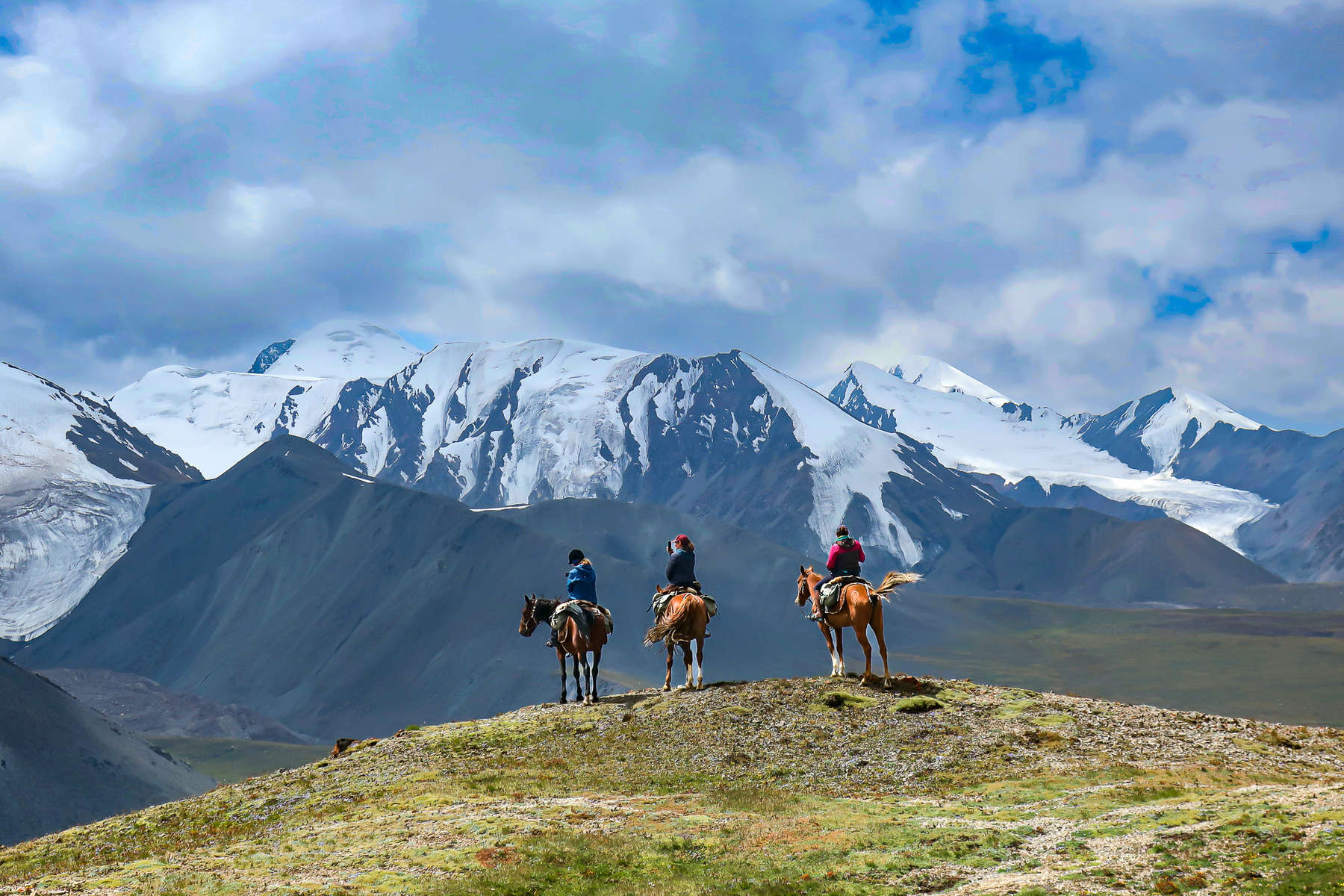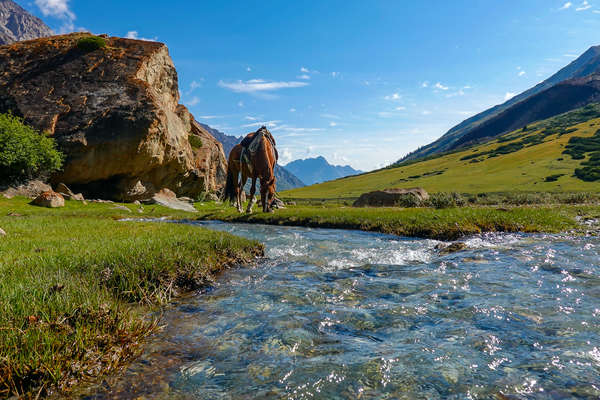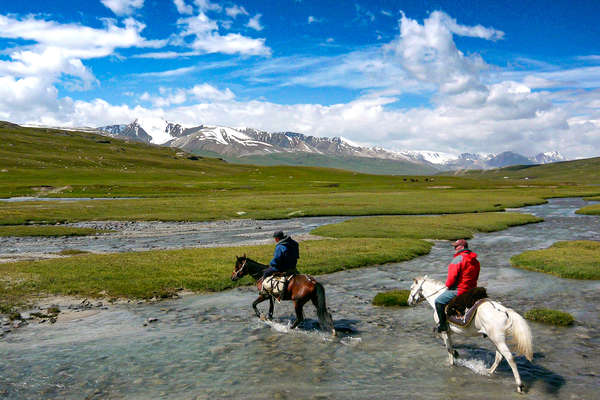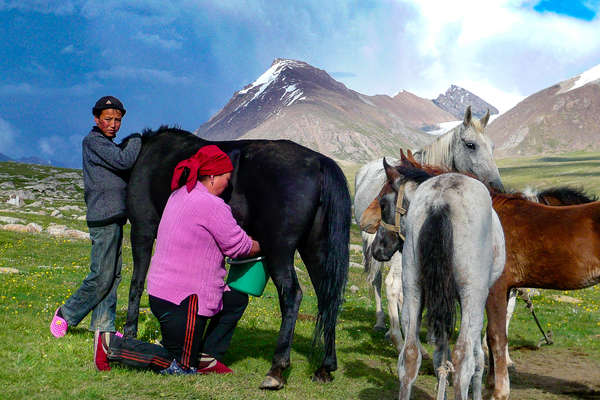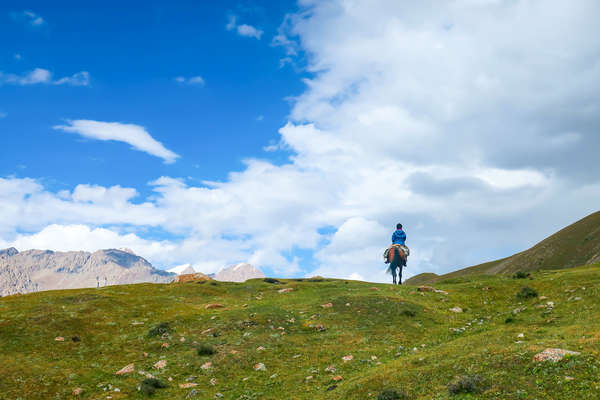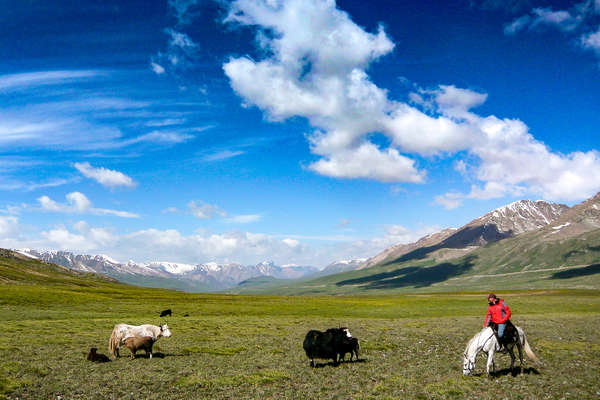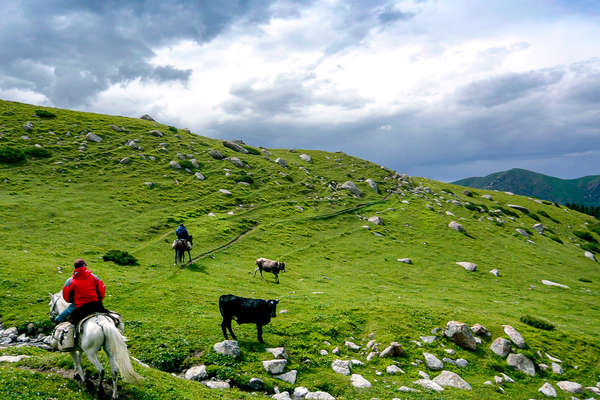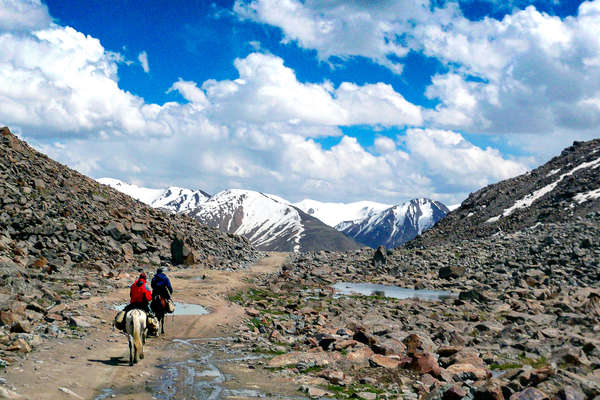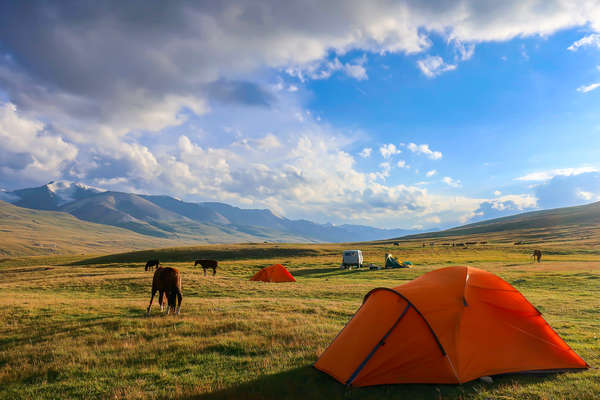Comfort
During the trail you stay in two man tents and should take your own sleeping bags and mats.
In Barskoon you will share a room or yurt.
In Bishkek you stay in double or triple rooms with private bathrooms.
Meals
The food is simple and abundant, using as many fresh ingredients as possible and prepared daily by the cook.
Breakfast consists of eggs, bread, cheese and dried fruits.
Lunch is a picnic and consists of bread, cheese, meat, fruit and chocolate.
Dinner often starts with a hot soup followed by a main of meat, salad, pasta, rice and followed by cheese, fruits or chocolate.
Climate
The weather is likely to be changeable.
In Bishkek and at low altitudes it can be hot and dry, but in the mountains and at altitude you can experience many variations. It can be warm during the day but the temperature will drop to around zero or below at night. You could experience rain, hail or even snow as well as wind but the bad weather rarely lasts long. The area actually reports low rainfall throughout the year but you should be prepared with many warm layers and waterproof clothing.
Tips
It is customary to tip but this is entirely at your discretion. In Bishkek you may wish to tip 10%, but on the trail we recommend c. £5 - £10 per person per day to be split amongst all the team.
Packing list
Please pack carefully and sensibly: the following guide is here to give you an idea of what to bring. Please note: you will be riding at altitude and the weather can be unpredictable, even in the summer, so make sure to bring layers and enough warm clothing, waterproof gear and gloves – these are a must throughout the season. Please also use a soft sided case / bag which can easily be transported. You can leave extra luggage not needed for the trail at the guesthouse in Barskoon. On this ride, you will be accompanied by a support vehicle.
We also recommend bringing waterproof hiking/riding ankle boots that you can wear with half chaps, as there may be some sections where you will need to dismount and lead your horse downhill (and normal riding boots won’t provide enough grip). Please ensure these are suitable for riding, with ankle support and a small heel.
Head
- Helmets are mandatory on the ride. Please bring your own to ensure a correct fit.
- Sunhat for when not riding
- Sunglasses - with a cord attached so they don't fly off when riding
- Buff or bandana
- Warm hat for cold nights when camping
Upper body
- Thermals (long or short sleeved)
- Long sleeved shirts provide protection from the sun and are an extra layer
- T-shirts
- Lightweight fleece or jumper
- Warm fleece or jumper (and a spare in case one gets wet)
- Warm and waterproof jacket - it can rain at any time of year and the evenings can be particularly cold
- Swimming costume - for swimming/bathing in rivers/hot springs
Legs
- Lightweight, comfortable riding trousers or jodhpurs - we recommend riding in them at home before taking them on holiday to ensure they don't rub
- Thermals
- Casual trousers for the evenings, such as jeans or tracksuit bottoms
- Waterproof over trousers
Hands and Feet
- Comfortable riding/hiking boots - as above
- Additional waterproof shoes/boots if needed
- Trainers or equivalent light shoes for moving around the camp in the evenings
- Several pairs of warm, thick socks
- Gloves - your hands are particularly exposed to the sun, cold or rain whilst riding. Waterproof gloves can be particularly useful
Nightwear
- Sleeping bag. You need at least a comfort factor down to minus 15 celsius.
- Sleeping bag liner - silk, cotton or fleece - adds an extra layer
- Sleeping mattress (Therm-A- Rest mats are inflatable, warm and light)
- Pyjamas or tracksuits or thermals for sleeping in
Other useful items
- Towels - camping ones will both dry and pack more easily
- Small backpack for accessing items required during the day (carried by support crew)
- Camera and high capacity memory card. Spare battery
- Bumbag for carrying your camera and small items whilst riding
- Headtorch or small torch for moving around camp at night - bring spare batteries and bulbs
- Water bottle (2 litres or 2 x 1 litre)
- Swiss army knife
- Field glasses
- Wet Wipes or equivalent (for when washing facilities aren't available)
- Toilet paper and a lighter to burn it with
- Small plastic bags for rubbish
- Ear plugs (for light sleepers)
Medical kit
- Any medication you regularly take
- Sunscreen and lip balm - should be high factor
- Insect repellent, preferably containing deet
- Blister plasters in case of any rubs
- Antiseptic cream, plasters, aspirin, anti-histamine, insect-bite salve etc...
- Spare prescription glasses/contact lenses
- Eye drops
- Imodium or similar anti-diarrhoea medication
- Re-hydration sachets
- Water purification tablets
- Antiseptic wipes
- Handwash gel
- Micropur tablets to purify water
Other recommendations:
- Backpacks cannot be worn whilst riding. We recommend a small bumbag or a coat with pockets so that you can carry small items with you during the day (passport, camera, sunscreen, lipbalm etc)
- We recommend travelling in your riding boots and carrying your hat and some riding clothes in your hand luggage - then if your luggage goes astray you are still able to ride!
- Tall riders may benefit from taking a pair of long stirrup leathers with them (the local stirrups are adjustable but are sometimes limited in length)
- We recommend taking a copy of your passport and insurance documents with you in case you lose your originals
- Please take your rubbish home with you. There are no recycling facilities in Kyrgyzstan, so take your used batteries, aerosols etc back home and dispose of them appropriately. Try to leave excess packaging material at home before travelling

